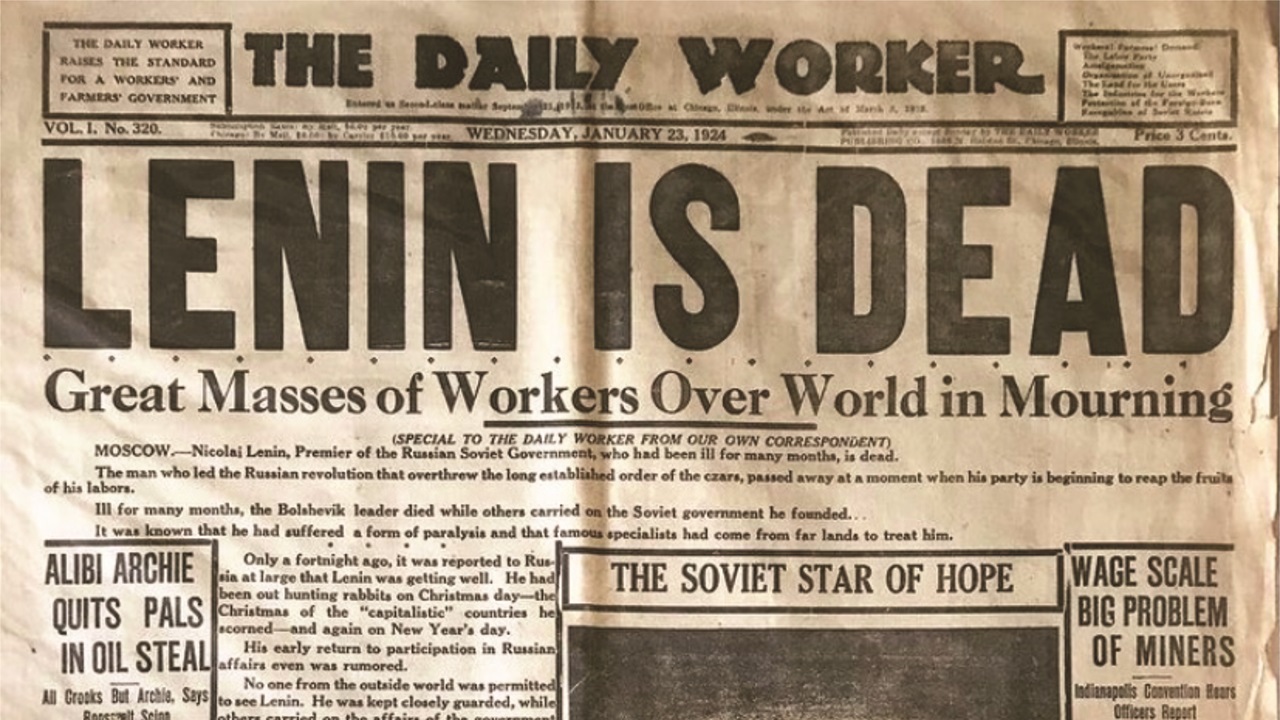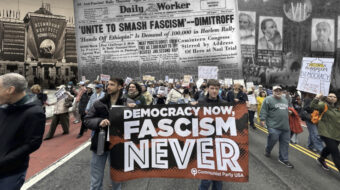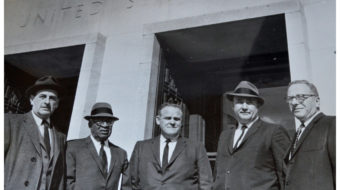
This article is part of the People’s World 100th Anniversary Series.
January 21, 2024, marks the 100th anniversary of the death of Vladimir Ilyich Lenin, leader of the Russian Revolution. Reprinted below are a selection of articles from the Daily Worker, predecessor of People’s World, showing how the news was covered at the time.
Coming just a few years after the revolution, Lenin’s death was a shock to the workers of the world, who saw in him a great labor leader—the founder of the world’s first workers’ state. For Communists, who had built their parties on organizational principles elaborated by Lenin, news of his death was particularly tough to receive.
In the articles below, the deceased leader is referred to as “Nicolai Lenin,” one of the names he was most known by at the time. The “Workers Party” referred to in some of the articles is the legal name used in those days by the Communist Party USA.
LENIN IS DEAD
Great Masses of Workers Over World in Mourning
Daily Worker, Jan. 23, 1924

Special to the Daily Worker from Our Own Correspondent
MOSCOW—Nicolai Lenin, Premier of the Russian Soviet Government, who had been ill for many months, is dead. The man who led the Russian Revolution that overthrew the long-established order of the czars passed away at a moment when his party was beginning to reap the fruits of his labors.
Ill for many months, the Bolshevik leader died while others carried on the Soviet government he founded. It was known that he had suffered a form of paralysis and that famous specialists had come from far lands to treat him.
Only a fortnight ago, it was reported to Russia at large that Lenin was getting well. He had been out hunting rabbits on Christmas day…and again on New Year’s Day. His early return to participation in Russian affairs even was rumored….
Today came word of his death—many times rumored and as often denied. The Russian leader, hailed as one of the greatest men of modern times, died at ten minutes to seven Monday night. His death took place in a little town called Gorky, not far from Moscow. The funeral will be held on Saturday….
The death of Lenin came as a blow to his millions of followers. Despite his two-year absence from the Kremlin, he was first in the hearts of the Russians who rose behind him and overthrew the Romanov dynasty.
They had always looked forward to his return. Some few, who knew the worst, may have given up hope, but not the great majority of Russia. As this country’s commercial relations with other nations improved, the talk was always of “when Lenin gets back to work.”
Now Lenin is dead, of an illness which was not at first disclosed. He lived, however, to see the state he dreamed of and fought for take its place among the nations of the world; a state not yet recognized by many governments, but standing on its own feet.
At half past one this afternoon, the physicians who had attended Lenin in his last illness, issued a bulletin describing the Soviet chieftain’s death. His condition had greatly improved, they said. Suddenly, on Monday, it took a turn for the worse.
Lenin died within a few hours. Paralysis of the respiratory organs was apparently the cause. The body will be brought to Moscow tomorrow and will lie in state until Saturday.
In death, Lenin is to be made accessible to all those who followed him and who could not be with him in his illness.
An official statement issued…said the Soviet Government will continue to carry out the will of the workers and peasants, in accordance with Lenin’s last wishes….
Nicolai Lenin, the $50-a-week Premier, who ushered in the dictatorship of the proletariat nearly six years ago, had been in failing health for many months….
Gene Debs Pays Glowing Tribute to Nicolai Lenin
Daily Worker, Jan. 23, 1924
TERRE HAUTE, Ind.—The death of Nicolai Lenin is a calamity to the Russian Soviet, Eugene V. Debs, Socialist leader, said here today.
“I regard Lenin as the greatest thinker that emerged from the world war,” Debs said. “He towered head and shoulders above every other statesman in Europe.
“Lenin has passed through an ordeal in the past five years such as never before faced by any human being. He has carried two bullets, fired into his body by an assassin, and at the same time been forced to bear a burden of official responsibility and care greater than any other man’s in the world.
“His place in history is certain. He will go down in history as one of the greatest statesmen, a towering personality, a heroic soul, and in the loftiest sense a champion of the rights and liberties of the common people.”
Moscow, in Mourning, Ready to Receive Lenin’s Remains
Daily Worker, Jan. 24, 1924
By Our Own Staff Correspondent
MOSCOW—While Moscow is a city of black, prepared to receive today the remains of Nicolai Lenin, the dead premier’s fellow leaders urged workers, farmers, and the Red Army to stand firm.
“Final victory of our party will be the best monument to Lenin,” a proclamation issued by the Central Executive Committee said.
Lenin’s body was to lie in state here until Saturday when it will be interred in the Kremlin wall. Tens of thousands of his comrades are to be given an opportunity to gaze for the last time on the stilled features of the most powerful revolutionary figure of all time….
Nicolai Lenin died silent, uncomplaining. An eyewitness to the passing of the Russian Premier gave to the Daily Worker today the first story of how the end came. At noon on Monday, Lenin told his household he had a slight headache and went to bed…. The death agony set in at 5:30 p.m. Lenin spoke not a single word. He was unconscious at the last.
After death had been pronounced, the body was dressed in a brown suit with white socks and soft brown slippers and placed on a table in the reception room.
The Premier’s face showed no change. It has a healthy appearance. The table was heaped with flowers.
A little later, the ministers of the Soviet government began to arrive, having come hurriedly from Moscow to Gorky, where Lenin’s villa is located…. After the ministers came throngs of peasants, pouring out to Gorky in a continuous stream, surrounding the house.
All Russia is Silent as Lenin is Laid to Rest

Daily Worker, Jan. 28, 1924
Special to the Daily Worker
MOSCOW—The body of Nicolai Lenin was interred today in a temporary mausoleum in the Red Square with the heroes of the revolution.
Every form of activity ceased for five minutes throughout the vast territory that was once the czar’s, but now belongs to the workers and peasants of Russia, while the body of the world’s greatest revolutionist was placed in its resting place.
All trains, telegraphs, and telephones ceased operation while the boom of a hundred guns—the salute of the Red Army and the revolution to its leader—shook the air. All larger cities fired one hundred guns, twenty-five rifle shots were fired in the towns and in the villages, and thus all of revolutionary Russia at the grave of Lenin in a last token of respect, love, and regret.
Just before the five minutes of silence, this message went over telegraph to every city and hamlet in Russia: “Lenin is dead, but his work goes on.”
The radio orchestras played “The Internationale,” the crimson banners of the Red Army dipped, and the ceremony was over.
The services in Moscow began at 9 a.m. Up to the moment the guard of honor and the pallbearers came for the casket, an endless stream of mourners filed past. Thousands cried out, “Ilyich! Ilyich!” as they passed the casket.
Krupskaya, Lenin’s wife, sat near the casket, quiet and composed but pale as the corpse of the man whom she loved and by whose side she starved for the revolution, dodged the czar’s police, and fought for the Soviet revolution he lived to see victorious.
The body was placed in the mausoleum so that a mirrored reflection of it could be seen from the outside. The brain and heart of Lenin, with his manuscripts, will be preserved in a Lenin museum already established by a decree of the Soviet government.
The Mercury was 25 below zero as the preparation for the funeral began, with the crowd which has been gathering since early morning continued to increase until its outermost limits were lost to the eye. All of Moscow had turned out to pay a last tribute to the dead leader.
In all of Russia today, there is no other sound than that of mourning.
25,000 toilers in New York Lenin Memorial
Daily Worker, Feb. 7, 1924

By Norman Smith
NEW YORK—The greatest revolutionary demonstration in the history of New York took place here at Madison Square Garden when 15,000 workers pledged themselves to carry on the work of Nicolai Lenin, in whose honor they had gathered.
Ten thousand men and women were turned away from the doors, full to overflowing an hour before the meeting began. Police reserves on the job said they had never seen anything like it in all their experience. The overflow crowd was gathered up by Workers Party ushers and assembled in Central Opera House, which was hastily engaged.
Solemnity gives way to cheers
Inside the mighty Garden, the masses filled every available bit of space in the great arena and in the galleries which rise tier after tier along the walls.
They sat down in an atmosphere of solemn emotion that was deepened by the strains of the Russian funeral march played by the Russian Symphony Orchestra, but before the meeting was over, their enthusiasm for Lenin’s cause overcame their original grief, and they were cheering the call of the Russian workers to carry on the fight for world revolution to which Lenin had dedicated his life.
…
Ruthenberg speaks
C. E. Ruthenberg, Secretary of the Workers Party, was given a great ovation as he arose:
“Since the first written record, men have sacrificed that people might be free,” he began. “If you go back to Greece, you find slaves revolting so they could play a part in a free society. If you read history through the thousand years of feudalism, you’ll find an exploited class struggling to be free. At all times, there have been dreams in men’s hearts that oppressed and oppressor would be no more.
“When future historians write the record of these years, they will write Nicolai Lenin down as the leader of that movement that led the workers into the struggle to abolish capitalism from the face of the earth.
“Lenin fought for the workers everywhere; other statesmen fought for the rights of individuals. Lenin gave the workers’ world his life. He gave his life organizing the working class into a party that could fight for Soviet republics in every country upon principles followed by the Communist Party.”
…
Numerous telegrams read
Here followed the reading of numerous telegrams from locals of the International Ladies Garment Workers Union and other labor organizations and workmens’ circles, expressing their sorrow at Lenin’s loss and their determination to carry on his work.
Then the chairmen called for a cessation of the cheering and began to read the call to world solidarity that had been radiogrammed by the workers of Russia. The air was charged with the electricity of repressed emotions as the audience listened breathlessly, then the huge shouting as 15,000 voices claimed the slogan, “The proletariat never, never can lose. Proletariat of all lands unite.”
Chopin’s funeral march against set the solemn note, and then the chairman sent the battalion of collectors through the crowd. The sum of $1,500 was raised.
…
“Join Lenin’s Party,” says Foster
William Z. Foster followed with an appeal for membership in the Workers Party that crystallized the feeling of the sympathizers present. He first paid tribute to Lenin’s great revolutionary brain.
“Lenin was not only a great thinker: He was also a great strategist. I have no hesitation in saying that Lenin’s action at Brest-Litovsk saved the Russian Revolution. Lenin was brave enough to go to the workers and appeal to them to allow a certain percentage of capitalism to return to Russia. It required a courageous man to do that. Lenin, by that piece of strategy, saved Russia.
“The Workers Party is the party of Lenin. If you believe in what Lenin taught, in what he did, you can express it only by joining the Workers Party. The Workers Party follows the principles of Lenin’s strategy. it is the only party in America, both in the political and industrial fields, with the correct policy for the workers.”
…
The gigantic Garden demonstration evoked news stories and comments in all of New York’s papers. The New York Times declared that Foster urged 15,000 people to join the party of Lenin and further the work of revolution in the United States. And the New York World reported that Madison Square Garden glowed red. Packed to limit, it echoed the shouts of thousands who arose to their feet to cheer: “Lenin is dead; Long live Leninism!”
We hope you appreciated this article. At People’s World, we believe news and information should be free and accessible to all, but we need your help. Our journalism is free of corporate influence and paywalls because we are totally reader-supported. Only you, our readers and supporters, make this possible. If you enjoy reading People’s World and the stories we bring you, please support our work by donating or becoming a monthly sustainer today. Thank you!










